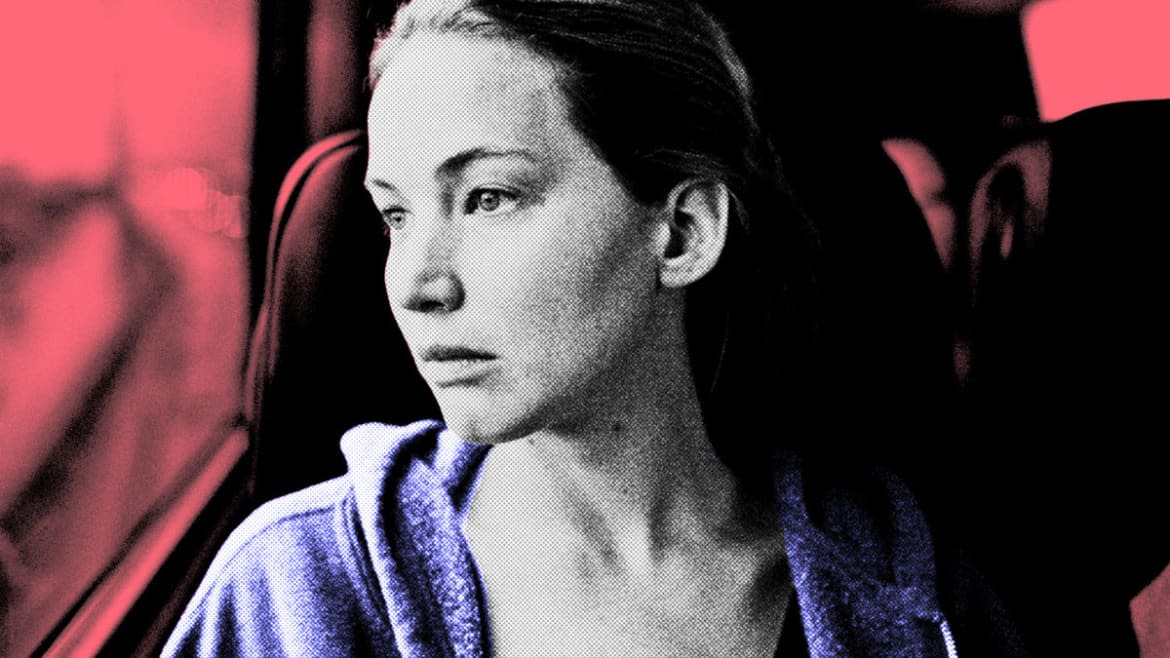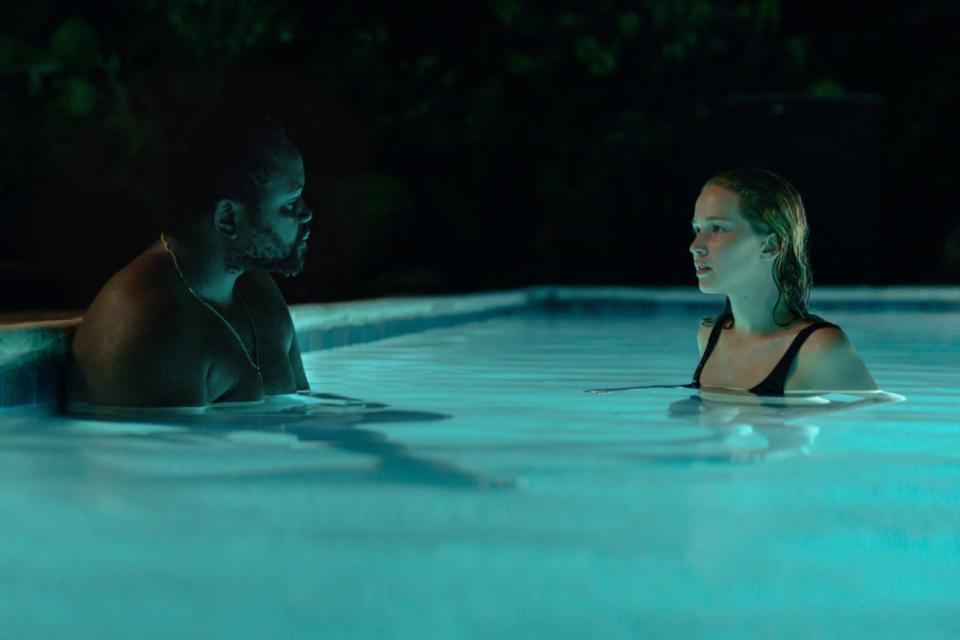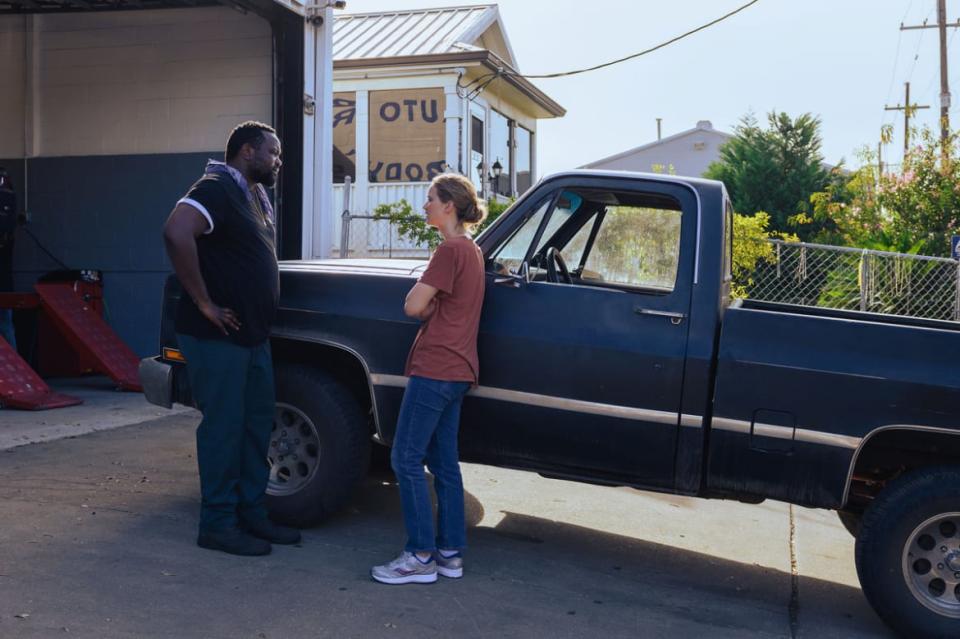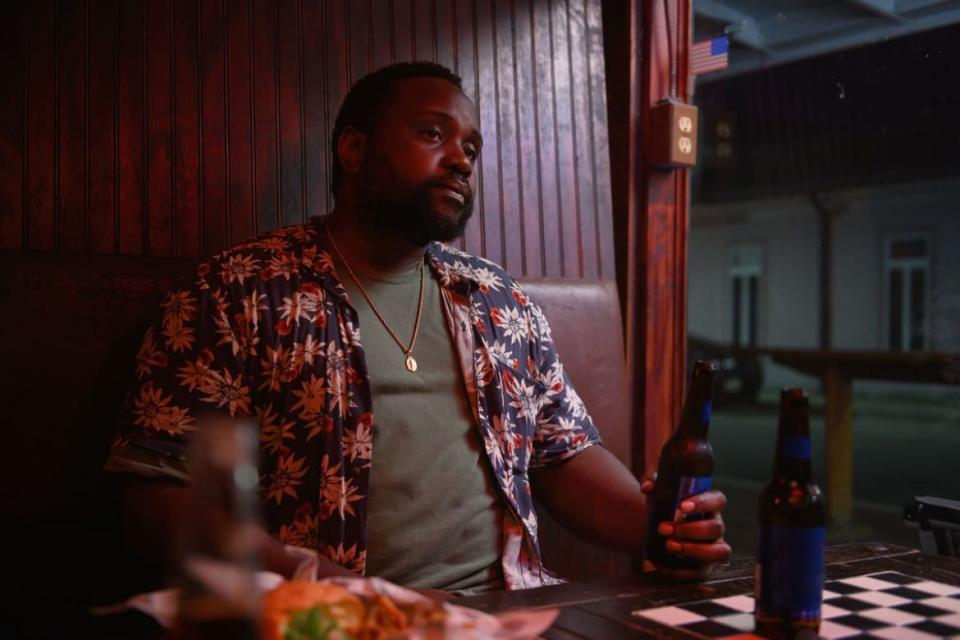‘Causeway’ Is Jennifer Lawrence’s Stunning Dramatic Return

“Home” is a complicated word. It conjures something different for everyone. Some stay attached to the places they were born and raised, continuing a cycle set in place by planting lifelong roots. Others run far away as fast as their feet, a car, or a plane can take them. Home can be a place, a person, a friend, or a feeling—sometimes all of those things at once.
When we first meet Lynsey (Jennifer Lawrence) in Lila Neugebauer’s Causeway—out Friday on Apple TV+—she’s been thrust somewhere in the middle, unsure of what to do with herself while she straddles her past and present.
Lynsey has just returned from deployment in Afghanistan. Her armored vehicle had been blown up by an IED, leaving her hospitalized with a significant brain injury and a substantial amount of PTSD. She spent months at a recovery facility with neuropsychologists and a live-in aide to help her work through memory gaps, physically rehabilitate, and prepare for civilian life. Now, she’s readying herself to return to the home she grew up in, a task that’s far easier said than done.
Ironically, Lawrence’s presence in the film feels like its own homecoming. Causeway marks the actor’s return to the quiet indies where her career got its start. Seeing Lawrence in this capacity again feels almost grand, even if her performance and the film itself are gentler and far more modest.

After Lynsey is approved to leave the rehab center, she travels back by bus to her native New Orleans. No one arrives to pick her up, and when she sees her mother (Linda Emond) later that day, the two only briefly exchange pleasantries before Lynsey goes to sleep. She eventually lands a job cleaning pools. When her car breaks down one afternoon, she meets a mechanic named James (Brian Tyree Henry), who becomes a friend in a city where she seemingly has none left.
Co-written by author Otessa Moshfegh alongside Luke Goebel and Elizabeth Sanders, Causeway unfolds like a novel. As Lynsey and James discover that they have more in common than they realized, the film’s deliberate pace and realistic dialogue ground the burgeoning friendship with authenticity. It’s a film that’s more focused on the development of its characters than any major statements about war or politics. Instead of opting for an overbearing thematic stance, Causeway is an optimistic but wholly pragmatic examination of how we move through our most acute traumas, led by two of the most captivating dramatic performances of the year.
Jennifer Lawrence Is Back to Wow the Red Carpet
Lynsey is trying to take her life back. After she’s finished cleaning the pools of wealthy New Orleans residents, she returns to the house her mother had to refinance three different times to sit alone in her room and play games of memory as part of her outpatient treatment. She eats, exercises, and tries her best to get a decent night’s sleep without waking in screaming terror. It’s all in service of getting herself back into good enough physical and mental shape to have her doctor sign off on approval for redeployment.

While her car remains in the shop, Lynsey becomes closer to James. Their connection is easy, something that doesn’t happen very often for either of them. James is charming and personable to strangers around town. Still, he’s deeply lonely, a lingering emotional ramification from a car accident that caused him to lose both a loved one and his left leg.
Neither James nor Lynsey has recovered from the trauma they incurred inside different vehicles, at opposite ends of the Earth, but life marches on anyway. For the two of them, there’s a comfort in the knowledge that recovery isn’t just nonlinear, but often stagnant. Fragments of memories fall into their lives and give them pause. James’ recounting of his loss brings Lynsey to try to connect with her mother, forcing her to remember why their fissures exist in the first place. Meanwhile, nights out with Lynsey drinking beers and smoking weed only serve to remind James of the life he once had.
Lawrence and Henry both navigate their characters’ pain with affecting poignancy. There are no sensational moments in the script; no one reaches the end of their rope and screams in guttural agony or breaks down into unsightly sobs. Causeway is, thankfully, free of those kinds of awards-baiting histrionics. Instead, James and Lynsey suffer like many of us do: almost entirely in silence. Their grief is revealed in small, rational actions. Henry holds cold beer bottles against James’ face like they’re the fleeting touch of an old love, leaning into them with a deeply resigned—and simply stunning—heartache.

Lawrence does a marvelous job at matching the physicality of not just a veteran, but someone who has incurred major physical trauma. She wears her character’s anxieties like a heavy weight on her shoulder, making Lynsey’s motions slight and reserved. But those who have been anticipating Lawrence’s dramatic return won’t be disappointed by this appropriately subdued performance. Causeway is one of the most potent turns in the star’s career, bookended by two magnificent scenes in the beginning and end of the film that serve as reminders of why Lawrence is one of the finest dramatic actors of her generation.
The film is a heavy exploration of deep-set trauma, and it occasionally buckles under the weight of its themes. Some will read the film’s central relationship as a will they/won’t they romance story, despite Neugebauer’s direction setting up the film’s intent from the start. Unfortunately, it’s an easy mistake to make, considering that Causeway is constrained by its limited runtime. It’s not a film that feels rushed, but rather underdeveloped at times. In a landscape of both theatrical and streaming fare that push the audience’s attention span with nearly three-hour-long epics, Causeway is the rare 90-minute film I wished was longer.
But aside from its tight runtime clipping some of the film’s dramatic payoff, Causeway is a blisteringly effective story about trying to reconcile the nature of home with the unavoidable feeling of loss that comes with it. These characters may feel that starting from square one is an impossible obstacle, but there is a new perspective to gain within the murky anxiety of every new beginning.
Get the Daily Beast's biggest scoops and scandals delivered right to your inbox. Sign up now.
Stay informed and gain unlimited access to the Daily Beast's unmatched reporting. Subscribe now.

